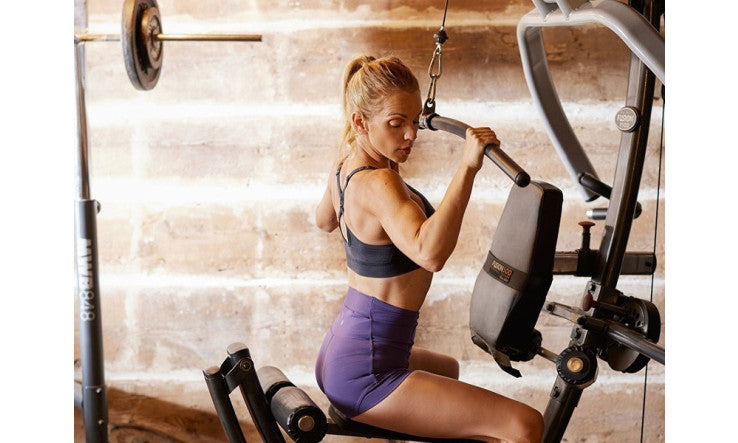Training supplement and more
- Athletic supplement.
- Improves strength/power/performance during repeated, short bouts of high-intensity physical activity (e.g., sprints, jumps, resistance training) (by increasing muscle/intramuscular creatine/phosphocreatine/energy levels).
- Increases body/muscle/lean muscle mass/size when used with a resistance training program.
What is creatine?
Creatine is a small peptide composed of amino acids. It is a naturally occurring molecule in the human body, particularly in skeletal muscles. Approximately 90 to 95% of creatine is stored in muscles, with the remainder found in the heart, brain, liver, kidneys, testes, and almost all cells.
As a supplement, it helps boost energy production in the body. This compound works by storing phosphate groups in the form of phosphocreatine, which promotes energy release and therefore helps develop strength and muscle growth.
This supplement is among the most popular that are sold to increase muscle strength. 1
And more...
Protective effects & cognitive functions
- There is a wealth of literature demonstrating that creatine has neuroprotective effects both in vitro and in vivo. Among others, creatine can protect against excitotoxicity (a complex process triggered by the activation of glutamate receptors that leads to dendrite degeneration and cell death3) as well as against β-amyloid toxicity in vitro. 2
- Due to its neuroprotective effects, creatine is currently in clinical trials for the treatment of Parkinson's disease and Huntington's disease. Creatine therefore shows great promise in the treatment of various neurodegenerative diseases. 3
- Its neuroprotective properties may help protect the brain. Additionally, cognitive improvements—such as improved alertness, focus, and attention—have also been observed. Creatine may help reduce the severity of depression symptoms, according to animal studies and small pilot studies in humans. 4
- Another study conducted in 2018 showed that oral creatine intake can improve short-term memory and intelligence/reasoning in healthy individuals. The results suggest a potential benefit for aging and stressed individuals. It was also mentioned that it would be imperative for creatine to be tested on patients with dementia or cognitive impairment. 5
Helps increase muscle mass & bone density
- By increasing the growth of lean muscle mass. It also increases body weight due to the muscles filling with more water. 6 Does taking creatine generate water muscles? No: optimal hydration of muscle cells allows the transfer of electrolytes and nutrients necessary for the proper functioning of muscles, naturally increasing their strength & energy during exercise! In an exchange , Dr. Peter Attia and Layne Norton, Ph.D. rightly mention that, given the better metabolism of nutrients, not taking creatine is like picking up pennies while sleeping on dollars...
- Some research reports that creatine supplementation improved fat-free mass, physical performance, and muscle morphology in response to intensive resistance training, following creatine supplementation after just one week. 7
- It may increase bone density when combined with resistance training in postmenopausal women. 8
Cardioprotective properties
- One study shows that it can help protect the heart and blood vessels. It may help increase endurance and anaerobic cardiovascular capacity. 9
Vegetarian diet
- A systematic review (9 studies) on the benefits of creatine supplementation for vegetarians vs. omnivorous athletes mentioned that creatine is naturally found in most meat products; therefore, vegetarians have reduced creatine stores and may benefit from supplementation. The results of these studies demonstrated that creatine supplementation in vegetarians increased total creatine and phosphocreatine concentrations in the vastus lateralis and gastrocnemius muscles, plasma, and red blood cells, often to levels higher than those in omnivores. Creatine supplementation resulted in (to name a few) increased lean tissue mass, muscle strength, muscular endurance, and brain function (memory and intelligence) in vegetarian participants. It was concluded that overall, it appears that vegetarian athletes are likely to benefit from creatine supplementation. As to whether creatine supplementation improved physical performance more in vegetarians than in omnivores, studies were mixed. 10
References:
1. Bird SP. Creatine supplementation and exercise performance: a brief review. J Sports Sci Med. 2003 Dec 1;2(4):123-32. PMID: 24688272; PMCID: PMC3963244. https://pubmed.ncbi.nlm.nih.gov/24688272/
2. Beal MF. Neuroprotective effects of creatine. Amino Acids. 2011 May;40(5):1305-13. doi:10.1007/s00726-011-0851-0. Epub 2011 Mar 30. PMID: 21448659. https://pubmed.ncbi.nlm.nih.gov/21448659/
3. https://www.sciencedirect.com/topics/neuroscience/excitotoxicity
4. Allen PJ, D’Anci KE, Kanarek RB, Renshaw PF. Chronic creatine supplementation alters depression-like behavior in rodents in a sex-dependent manner. Neuropsychopharmacology. 2010 Jan;35(2):534-46. doi: 10.1038/npp.2009.160. PMID: 19829292; PMCID: PMC2794979. https://www.ncbi.nlm.nih.gov/pmc/articles/PMC2794979/
5. Avgerinos KI, Spyrou N, Bougioukas KI, Kapogiannis D. Effects of creatine supplementation on cognitive function of healthy individuals: A systematic review of randomized controlled trials. Exp Gerontol. 2018 Jul 15;108:166-173. doi: 10.1016/j.exger.2018.04.013. Epub 2018 Apr 25. PMID: 29704637; PMCID: PMC6093191. https://pubmed.ncbi.nlm.nih.gov/29704637/
6. Kutz MR, Gunter MJ. Creatine monohydrate supplementation on body weight and percent body fat. J Strength Cond Res. 2003 Nov;17(4):817-21. doi: 10.1519/1533-4287(2003)017<0817: cmsobw>2.0.co;2. PMID: 14636103. https://pubmed.ncbi.nlm.nih.gov/14636103/
7. Volek JS, Duncan ND, Mazzetti SA, Staron RS, Putukian M, Gómez AL, Pearson DR, Fink WJ, Kraemer WJ. Performance and muscle fiber adaptations to creatine supplementation and heavy resistance training. Med Sci Sports Exercise 1999 Aug;31(8):1147-56. doi:10.1097/00005768-199908000-00011. PMID: 10449017. https://pubmed.ncbi.nlm.nih.gov/10449017/
8. Chilibeck PD, Candow DG, Landeryou T, Kaviani M, Paus-Jenssen L. Effects of Creatine and Resistance Training on Bone Health in Postmenopausal Women. Med Sci Sports Exercise 2015 Aug;47(8):1587-95. doi: 10.1249/MSS.00000000000000571. PMID: 25386713. https://pubmed.ncbi.nlm.nih.gov/25386713/
9. Chwalbiñska-Moneta J. Effect of creatine supplementation on aerobic performance and anaerobic capacity in elite rowers in the course of endurance training. Int J Sport Nutr Exerc Metab. 2003 Jun;13(2):173-83. doi: 10.1123/ijsnem.13.2.173. PMID: 12945828. https://pubmed.ncbi.nlm.nih.gov/12945828/
10. Kaviani M, Shaw K, Chilibeck PD. Benefits of Creatine Supplementation for Vegetarians Compared to Omnivorous Athletes: A Systematic Review. Int J Environ Res Public Health. 2020 Apr 27;17(9):3041. doi:10.3390/ijerph17093041. PMID: 32349356; PMCID: PMC7246861. https://pubmed.ncbi.nlm.nih.gov/32349356/
Maison Jacynthe disclaims all liability. All information contained on this page is not intended to replace justified allopathic treatment or to disregard the expertise of the medical profession. It is up to each individual to take charge of their own health, to inform themselves, and to make the necessary changes to improve their condition. Therapeutic supervision by a qualified health professional is obviously recommended.







































































Leave a comment